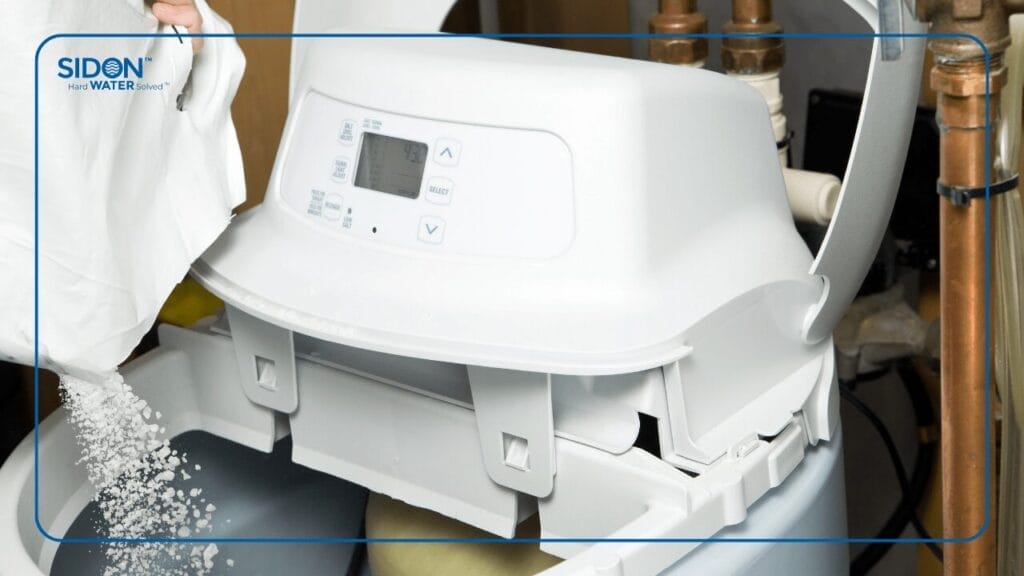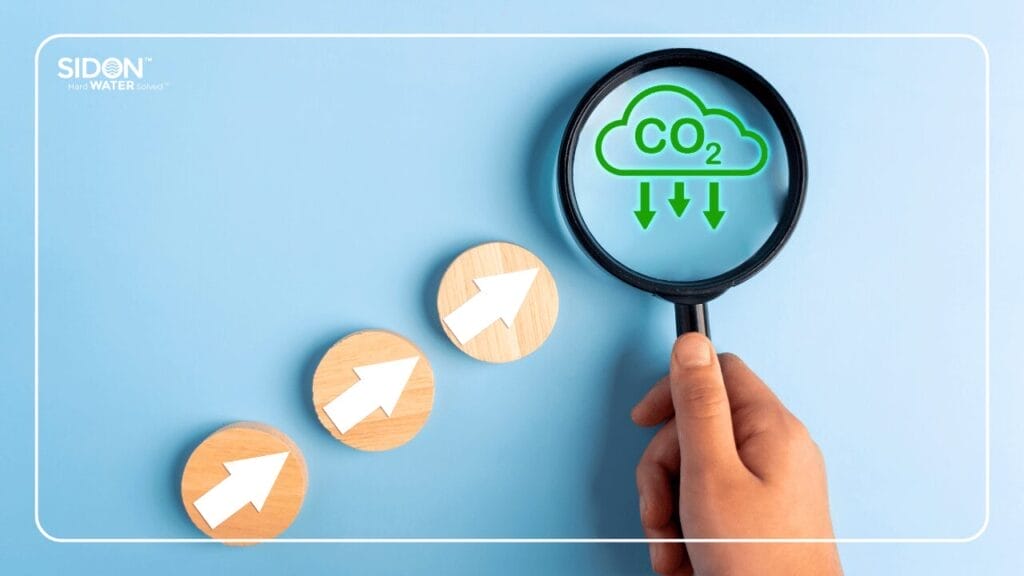Are you tired of dealing with hard water issues at home or in your business? Water conditioning systems might be the solution you need. These systems can significantly improve water quality, optimise appliance efficiency and save you money.
In this blog post, we will explain what water conditioning systems are, why they are important, and how the Integro™ system by Sidon Water can help you.
What is Water Conditioning and What are Water Conditioning Systems?
Water conditioning is the method of removing or altering minerals, chemicals and contaminants in a water system. The ultimate goal of this process is to prevent limescale build-up, which can damage appliances and reduce their efficiency.
Water conditioning systems are technologies designed to prevent limescale build-up via an electrochemical reaction. There are several types of water conditioning systems and each one comes with its own pros and cons. The key is to find the right system that matches your specific needs at your home or in your business.

Do I Need a Water Conditioning System?
Water conditioning systems help households and businesses tackle hard water problems effectively. They are particularly useful in areas with hard water and can significantly improve water quality in any setting. These systems eliminate scale build-up, reduce energy consumption and prevent rust and corrosion.
If you notice issues like rust, limescale, or poor water taste, it might be time to consider a water conditioning system. This is especially important in industries like hospitality, ice manufacturing, and healthcare, where water quality and optimised equipment performance are crucial. Water conditioning systems can lead to smoother operations and better results across various applications.
What is the Difference Between Water Softening and Water Conditioning Systems?
Do you wonder about the difference between water softening and water conditioning systems? Let’s break down these two terms to understand how each system works.
Water Softening Systems
Water softening is a process that removes Total Dissolved Solids (TDS), primarily calcium and magnesium. This is done through a method called “ion exchange.” In soft water systems, hard water passes through a tank filled with resin beads coated with sodium ions. As the water flows over the beads, the calcium and magnesium ions swap places with the sodium ions. This process removes the hardness minerals from the water and makes it soft.
Water softening systems are great for removing minerals that cause hard water. However, you need to keep them filled with salt, which can be costly and bad for the environment. You also need to ensure they are turned on and working properly. As they get older, they require regular maintenance.

If you don’t do these things, limescale can build up in your pipes and appliances. This build-up won’t go away when the softener is back online and can lead to equipment breakdowns and higher energy costs.
Water Conditioning Systems
There are several types of water conditioning systems. Over the years, systems using magnets, wrap-around coils, and radio frequencies have been developed.
These systems try to force the precipitation of the scale-forming minerals from the water solution. When in solution, these minerals are not visible but by forcing them to precipitate they move from a liquid to a solid state. Now that the minerals are out of solution and binding together in a new form, they may not create limescale but these visible deposits need to be filtered from your water system.
If you don’t filter out these solid minerals, they can clog appliances and heating equipment. Alternatively, the minerals can dissolve back into the water, causing the hard water problems to continue.
Which is the Market’s Most Effective Water Conditioning System?
After discussing the differences between salt softeners and traditional water conditioning systems, as well as the challenges they pose, it’s clear that dealing with hard water is not straightforward. There isn’t a one-size-fits-all solution, so understanding your specific issues and priorities is vital.
Recognising the limitations of salt softeners and traditional water conditioning systems, Sidon Water developed the Integro™, a groundbreaking technology. The Integro™ is designed to effectively solve hard water problems by preventing and removing all limescale throughout your water system, equipment, and appliances, regardless of the water hardness level.
How the Integro™ Works
The Integro™ prevents and removes limescale by injecting electrons into the water. These electrons disrupt the bonds that usually form between minerals, realigning the ions so they remain in their neutral form. As a result, ions like calcium and magnesium cannot bind together to form crystals, thus preventing limescale, irrespective of temperature or pressure.
Since the scale-forming ions stay in solution, they flow freely through the water system without causing any issues.
What Makes the Integro™ Unique?
The Integro™ stands out due to its unique operation and effectiveness.
Difference Between the Integro™ and Salt Softeners:
Unlike a water softener, the Integro™ does not remove minerals from the water. Traditional salt softeners work by replacing calcium and magnesium ions with sodium ions. Softeners can require regular maintenance and the constant addition of salt. The Integro™, on the other hand, restructures the minerals in a way that prevents them from binding together to form limescale. This means there is no need for salt or frequent maintenance. Crucially, the Integro™ removes existing limescale build-up over the first 1-3 months of use, something a softener cannot do.
Difference Between the Integro™ and Other Water Conditioning Systems:
Traditional water conditioning systems often force minerals to precipitate, turning them from a liquid to a solid state. This can lead to clogs if the solid minerals are not properly filtered out. Unlike these systems, the Integro™ uses a unique electrochemical reaction that keeps the minerals in solution. This prevents them from forming limescale and allows them to flow harmlessly through your water system.
By addressing the limitations of both salt softeners and traditional water conditioning systems, the Integro™ provides a more efficient and maintenance-free solution for managing hard water problems.
The Integro™ system offers numerous benefits:
- Prevents and removes all limescale: The Integro™ effectively prevents the formation of limescale and removes existing deposits, ensuring your water system stays clean and efficient.
- Greatly reduces rust and corrosion: By preventing scale build-up, the Integro™ helps to significantly reduce rust and corrosion in your pipes and appliances, prolonging their lifespan.
- Improves water quality: Our unique technology enhances the overall quality of your water, making it safer and more pleasant to use.
- Significantly reduces energy consumption: With the Integro™, your appliances run more efficiently, which can lead to substantial energy savings and lower utility bills.
- Helps prevent Legionella: The Integro™ helps inhibit the growth of harmful bacteria like Legionella, by removing scale which is the breeding ground and food source for the bacteria. Click here to learn more about Legionella Prevention.
- Lowers your carbon footprint: By reducing the need for harsh chemicals and improving energy efficiency, the Integro™ helps you achieve a more environmentally friendly water system.

Experience the Integro™ Difference!
If you’re ready to experience the benefits of the Integro™ system, don’t hesitate to reach out to us.
Book a call with our team today to learn more about how the Integro™ can improve your water quality and protect your appliances and equipment. Whether you are in the hospitality industry, ice manufacturing, healthcare, or any other field where water quality is crucial, we have the expertise to help you achieve optimal results.
